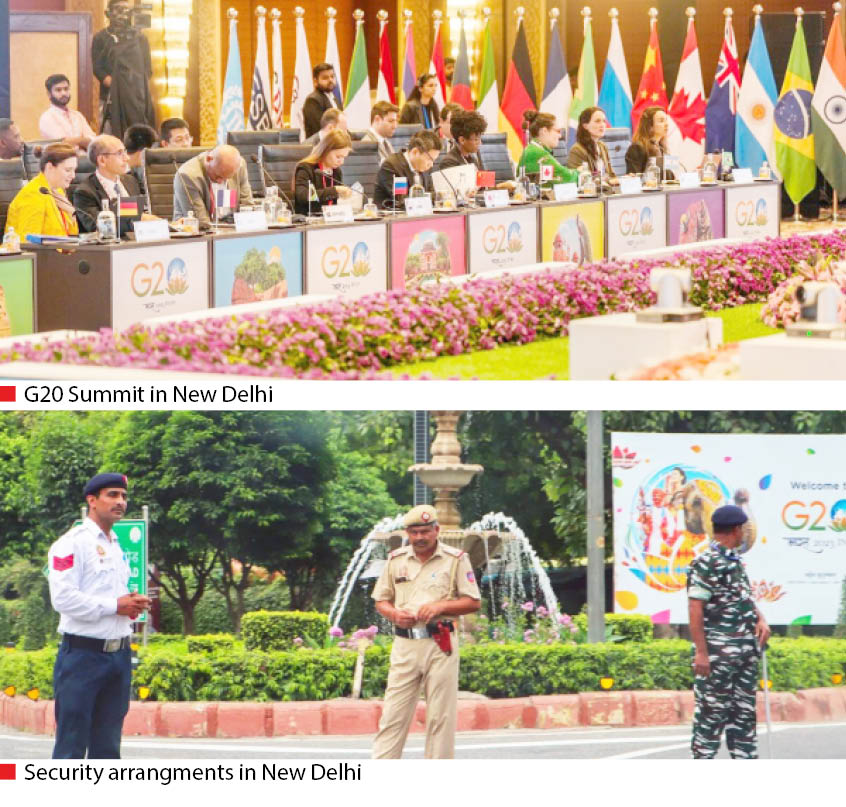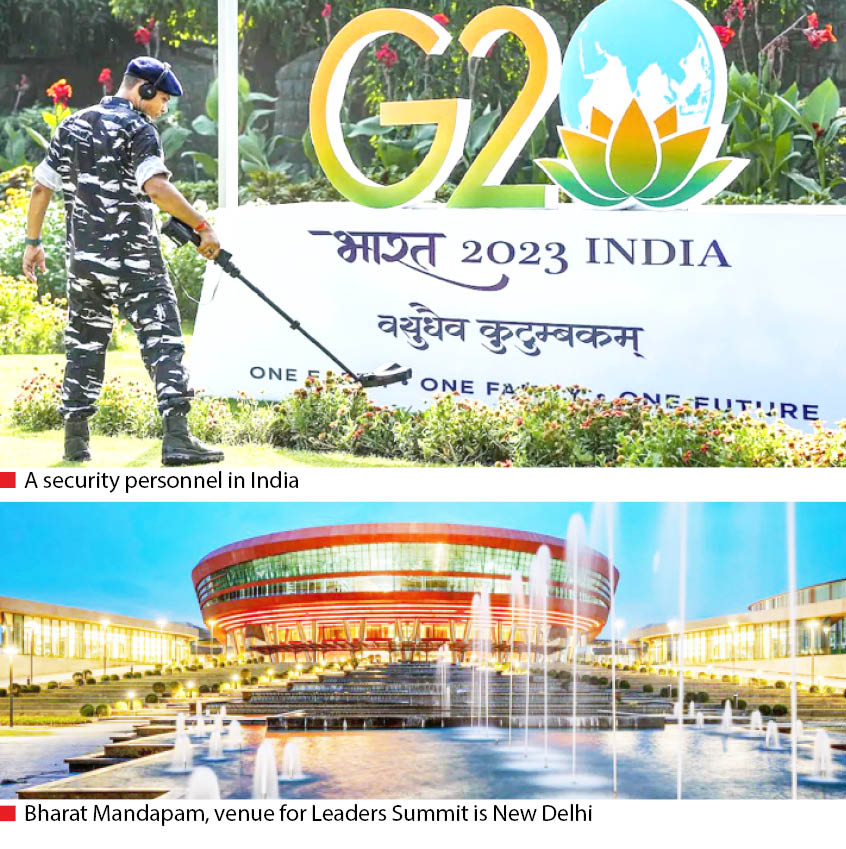Can G20 become voice of the developing world?
In a significant achievement for India’s G20 presidency, the African Union (AU) is likely to get full membership of the international economic forum. According to sources, a consensus has been reached on the issue and is likely to be a part of the declaration at the G20 Leaders’ Summit to be held in New Delhi […]

Preident Bola Ahmed Tinubu in India
In a significant achievement for India’s G20 presidency, the African Union (AU) is likely to get full membership of the international economic forum. According to sources, a consensus has been reached on the issue and is likely to be a part of the declaration at the G20 Leaders’ Summit to be held in New Delhi on September 9 and 10.
Nigerian President Bola Tinubu was the first head of state to land in New Delhi on September 5 as a special invitee for the G20 Summit. President Tinubu met Nigerian students in India and said that he was once a security guard but that a good education and can-do attitude was the reason he became Nigeria’s president.
Africa’s most populous nation and continent’s biggest economy is still analysing risks and benefits of becoming a permanent member of G20.
India has been pitching for the inclusion of the AU as a member of the G20 as a part of its commitment to be the voice of the Global South.
London-bound Nigerian Passenger dies aboard Egypt Air flight, corpse ‘dumped in Cairo’
Tinubu’ll tackle out-of-school children menace – Education Minister
The “Leaders’ Summit” on September 9 and 10, 2023, is the climax of the G20 process and the work carried out over the year.
Is G20 gaining relevance and G7 losing shine?
Having first met in 1976, the G7 was an effective forum for almost five decades. At the time, the G7 countries represented roughly 50 per cent of global GDP.
However, as time went by, this share has been on a constant downward trend, especially due to the rise of China and India. Today, the G7 countries represent around 30 per cent of global GDP, and the number will further contract.
As a consequence of this tectonic shift, it should come as no surprise that in 2008, when a global fiscal stimulus was needed to counteract the Great Recession, the matter could not be dealt with within this setting, and the G20 was first established.
The G20 members represent around 85 per cent of the global GDP, over 75 per cent of the global trade, and about two-thirds of the world population. The G20’s importance lies in the fact that it is more reflective of the world as a whole since its members also include developing nations from Asia, Latin America and Africa.
Is there a rift between the West and the Global South?
There is a wider feeling that the concerns of the Global South are ignored, and that international organisations like the UN, the IMF and the World Bank are rooted in the post-World War II period, dominated by a small number of countries.
Many experts felt that the Global South has its problems, and they should be heard. It’s not good enough to just hear issues of concern to the Americans and the Europeans.
This is further compounded by the fact that the G20, which is primarily supposed to deal with issues like climate change, development, global governance and green technology, among others, is being pulled into global security debates like the war in Ukraine.
The Indian government is recognising that global governance led by the UN system has failed and there are alternative, non-Western forums or a mix of the two that have to take up some of those responsibilities.
A big percentage of population in the world is of the opinion that the West is focused on the Russia-Ukraine war, and it believes that its conflict is the world’s conflict, but it (the West) has been absent when the Global South has needed help such as with a climate adjustment fund or when Sri Lanka was undergoing its worst financial crisis.
Why Xi and Putin are absent
President Xi Jinping began his third term with a diplomatic blitz that bolstered his image as a global statesman and attended every G20 leaders’ summit since taking power in 2012. Now Xi seems to be taking a different approach, dodging an event where he could have likely face thorny questions over China’s economic trajectory, Beijing’s military aggression toward Taiwan and his support for Russia after its invasion of Ukraine.
Xi is now in an “emperor mind-set” and expects dignitaries to come to him, according to Alfred Wu, associate professor at the National University of Singapore’s Lee Kuan Yew School of Public Policy. “Xi also received special treatment at the BRICS summit which was unlikely to receive at G20,” Wu added.
Media analysts in New Delhi suspected Xi had little interest in participating in an event aimed at bolstering the global profile of a rival with whom China has territorial disputes.
Putin has clear reasons for skipping the summit because Russia has rejected the validity of discussing the war at the G20, arguing that as an economic body it has no business considering security matters.
Deep divisions raise questions
In the middle of the high-octane summit, one question hovers over New Delhi’s hazy air: Does this annual meeting still serve any purpose when the US and allies are there under the same tent as China and Russia.
The absence of President Putin and President Xi at the summit made this more complicated. However, the two countries are represented by senior officials: Foreign Minister Sergey Lavrov from Russia and Chinese Premier Li Qiang.
A foreign policy observer in Delhi shared his views that China’s reactions signalled that Beijing has reservations against India’s leadership of the Global South.
Differences are also emerging between the US-aligned G7 and the wider G20 over a new commitment of funding for developing countries to meet United Nations-backed targets on everything from hunger and education to clean energy and climate change.
There are several issues with deep disagreements. Since the joint declaration is often a last-minute affair involving a lot of hard bargaining, India has little time to create a consensus. But the question is: Will China allow India its moment of global leadership when the two countries are locked in a border face-off and India is trying to emerge as an economic alternative to China?
The possible outcome
Russia has rejected the validity of discussing the war at the G20, this has been China’s position too, as it draws closer to Russia. The Western states insisted that it condemns Russia and the invasion in the strongest terms.
However, the majority of the membership from the Global South has tried to stay neutral in the conflict. They are more concerned about the war’s consequences, including its effect on food and energy prices, which particularly affect developing economies.
Despite these disagreements, the G20 has managed to make progress on some issues. G20 meetings have been one of the main forums through which reform of the Multilateral Development Banks has been discussed. The proposals include reforming the internal policies of the World Bank and other development banks to allow them to borrow more capital and lend it at concessional rates – especially for climate projects.
Another ray of hope is that over the past two years, the G20 has been chaired by developing economies: Indonesia and India. Because of their neutrality, these countries have greater credibility when they try to manage the stand-off between the West and Russia, so the G20 can function in some way.
With the next two hosts, South Africa and Brazil, sharing a similar inclination, the G20 might continue to function, even if the thornier global problems prove beyond its capacity to address.
In an era of fragmenting global governance, that might be the best that can be achieved.
Jai Kumar Sharma is Consultant Editor based in New Delhi
